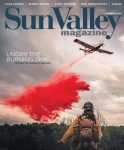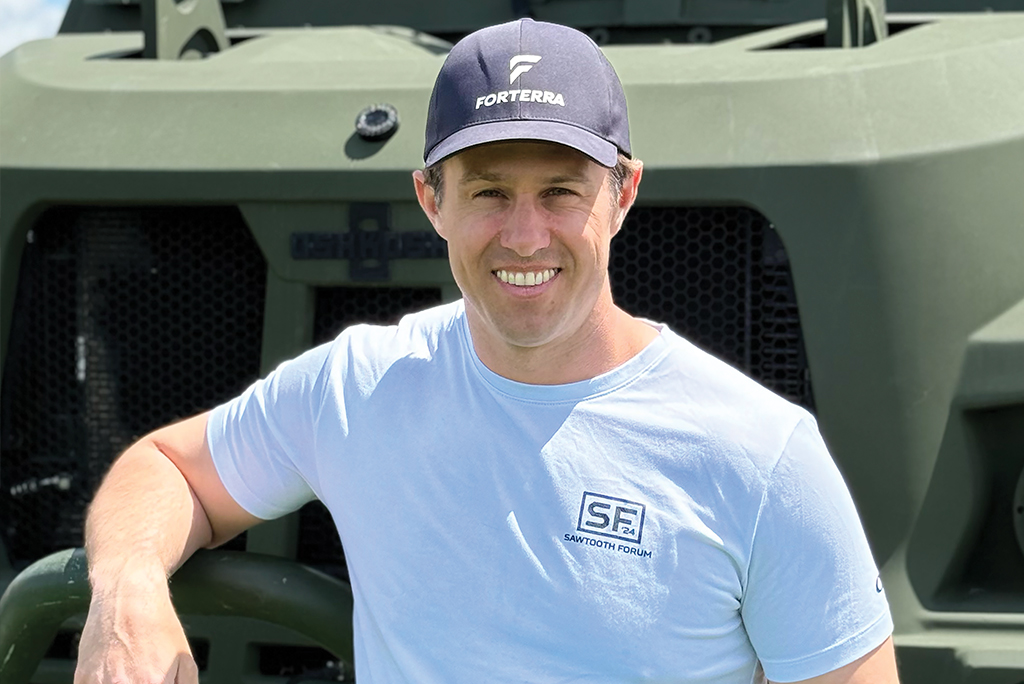As a recent addition to the local business landscape of the Wood River Valley, Defense Technology startup Forterra breaks the mold of the typical mountain town business that the Sun Valley area has attracted for generations. Unreliant on the local tourism economy, Forterra has been steadily expanding its operations at both its Carey test facility and Ketchum operations office, thanks to Valley local Scott Sanders, who serves as Forterra’s chief growth officer.
Sanders was born and spent his early years in Seattle before moving to Ketchum in 1996, entering fifth grade at Hemingway Elementary School. He and his family had ties to Sun Valley that go back to the beginning of the resort itself. Sanders’ grandparents were among the first droves of eager skiers, who began enjoying Idaho’s idyllic slopes in the 1930s and never stopped.
Like many local Ketchum kids, Sanders developed a love for skiing and the expansive “backyard” Idaho’s public lands provided. “In retrospect, I had a really great childhood growing up in the Valley,” says Sanders. “I really developed an appreciation for the incredible access to nature that you get in Sun Valley.”
After graduating from Wood River High School, Sanders knew that he wanted to experience life outside the Valley. At the time, a nearly ubiquitous television commercial for Norelco electric razors, of all things, would serve as an unlikely inspiration that set Sanders onto the path of military service. The spot featured Virginia Military Institute (VMI) students trying out the company’s latest offering and piqued Sanders’ curiosity.
After consulting with some VMI alumni and hearing that the institute and its program were famously difficult, Sanders knew he wanted to take on that kind of challenge, noting, “If you tell me I can’t do something, I’m definitely going to try to go do it.”
The year was 2004, and a good number of Sanders’ fellow Wood River Wolverines had either enlisted in the military or enrolled in service academies in direct response to the 9/11 attacks. For Sanders, who was not entirely certain he wanted to commit to military service, VMI offered the opportunity to experience an intense military program without needing to commit to service. The only service requirement was enrollment in one of the ROTC programs. Faced with deciding which of the ROTC programs to select (Army, Navy, Marines, etc.), Sanders took his cue from the upperclassmen he had seen around the campus. He noticed right away that many of the cadets who exhibited exceptional leadership skills and had their uniforms adorned with gold stars denoting academic achievement were in the Marine Corps ROTC program, and he decided to follow suit.
When he graduated from VMI in 2008, Sanders was commissioned in the United States Marine Corps, entering as a Second Lieutenant and Intelligence Officer in the Marine Corps. He would spend nearly a decade in the service, eventually becoming an operator with Marine Forces Special Operations Command (MARSOC) as a Marine Raider.
In 2014, after multiple deployments, Sanders’ Marine Special Operations Team (MSOT) group was deployed to the Philippines to help reestablish a U.S. military presence in the country and continue the development and training of the Philippines military, with which the U.S. has shared a mutual defense obligation since 1951. Throughout their time in the Philippines, Sanders and his team needed to develop strategies to help them overcome not only the obvious language barrier but also the dramatic differences in training and experience. After MARSOC denied their petition to develop technology to aid in their endeavor, Sanders and his Special Forces cohorts elected to take on the challenge themselves. Through the cobbling together of available ‘off-the- shelf’ technologies and some ingenious computer engineering of their own, they were able to create a serviceable solution, but the exercise impressed upon Sanders the huge technology gap facing service members in the field.
After suffering a bullet wound to his spine, Sanders concluded that his time in the military–and defense as a whole–was over. However, after meeting with the five co-founders of the Defense Tech firm Anduril, his mind was immediately changed. As Sanders put it, Anduril’s aim was to “redefine how technology is developed for the Department of Defense.” Given his first-hand experience with the technology deficit in the Philippines, the mission of Anduril was too compelling to pass up.
Over the next four years, Sanders found a home with the Anduril team, working alongside fellow combat veterans and computer engineers to create a meaningful impact on the tools available to America’s fighting men and women. While building out Anduril’s testing facility in southern California, Sanders ended up working with a landowner who happened to also own a considerable amount of property in Blaine County, just south of Carey. It was this connection that paved the way for Sanders to return to his hometown to continue his work helping the armed forces leverage technology to keep Americans out of harm’s way. After joining the Forterra team in 2022, Sanders was again tasked with finding a location for a testing facility, and he knew at once who to call.
The rugged landscape of southern Idaho offered the ideal terrain for Forterra to test their autonomous vehicle platform, as it perfectly mimics the extreme climate and topography their vehicles are likely to encounter on deployment. Sanders could not have asked for a more ideal opportunity to carry on his work while being afforded the chance to return to his hometown. “I found this very unique situation in life where I get to spend a lot of time in this place that I loved growing up, and want to live long term,” reflects Sanders. “But at the same time, I get to work on something super impactful that hopefully changes the way we defend our country and our way of life.”


